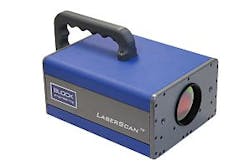A range of spectrometers based on widely tunable quantum cascade lasers includes LaserScan to analyze surface chemistries from a distance of 6 in. to 2 ft., the LaserScope IR microscope, and LaserTune tunable QCL source for researchers. The instruments are designed to replace FTIR spectrometers in military, life science, pharmaceutical/chemical, plastic manufacturing, and environmental applications.
Block Engineering
Marlborough, MA
www.blockeng.com
-----
PRESS RELEASE
Block Engineering Introduces Family of Quantum Cascade Laser Mid-IR Spectrometers
Marlborough, Massachusetts –August 17, 2010
Block Engineering, a leading developer of Mid-infrared spectroscopy sensors, announced today the launch of a family of next-generation, revolutionary spectrometers based on widely tunable quantum cascade lasers (QCLs). Daniel Cavicchio, chairman of Block Engineering, commented, “This announcement is a significant milestone in Block’s history and it is the result of a multiyear focused development effort, which was supported by significant government and internal funding. Our customers have received these products very well and we look forward to strong growth over the next few years.”
“The applications of QCLs are so broad that we have attracted strong interest from both commercial and government customers,” said Adam Erlich, VP of Marketing and Business Development of Block Engineering. “This is the reason for introducing three products at the onset: LaserScan™, which can analyze surface chemistries from a distance of 6 inches to 2 feet; LaserScope™, which is a high-performance IR microscope; and LaserTune™, which is a tunable QCL source used by researchers. Because all these products have enhanced performance versus traditional Fourier Transformed Infrared (FTIR) spectrometers, we are experiencing huge interest among military users, life science researchers, pharmaceutical/chemical companies, plastic products manufacturers and environmental firms.”
Petros Kotidis, CEO of Block Engineering, commented, “Block’s staff has unique, deep knowledge of spectroscopy, rugged packaging, signal processing and decades of experience in new product introduction for both commercial and government markets. These new products have been developed in record time and I am very pleased to see that we are meeting and exceeding our customers’ needs in our new and exciting target markets.”
Posted by Lee Mather
Subscribe now to Laser Focus World magazine; it's free!
